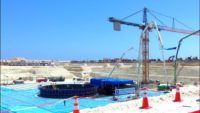
Relentless scrutiny of troubled projects for the 2014 Sochi Winter Olympics and efforts to grow Russia's energy exports have resulted in the country forming, on Nov. 5, a national Construction, Housing and Utilities Ministry.
Russian Federation President Vladimir Putin wants more control over the country’s ambitious but troubled building program; however, it’s still unclear what programs and projects will be priorities for the new ministry, according to Leonid Zborovsky, manager of Thornton Tomasetti’s Moscow office. Local ministries of regional development likely will have less responsibility for construction, but there is no specific outline for a state building program. “Maybe this is a step toward that, but right now things are very scattered and disorganized," he says.
Numerous reports from both Russia and abroad say the construction of the Olympics compound in Sochi—hotels, stadiums, new roads and rail extensions, among other projects—has been a disaster. Putin fired Sochi’s ski-jump-facility construction manager for cost overruns; state-owned Russian Railways has been accused of illegally dumping construction waste, and human-rights organizations are lamenting cases of non-payment to thousands of workers.
During a long-standing financial crisis, many other high-profile projects have endured fraud, cost overruns and total stoppages. Moscow’s Federation Tower, scheduled to be Europe’s tallest skyscraper, experienced all the above.
“It lost financing like many projects did during the financial crisis. Credit Suisse and others backed out,” explains Zborovsky, who provided structural design, project-development and construction-technology services on the project. “Now, it has financing from a Russian bank and is nearly complete.” The Moscow Times reported in November that unfinished projects, housing shortages and utilities prices have become “a sore point throughout the country.”
While controversies and questions remain, the country is starting to see some major economic development and success in its energy sector. Russia’s nuclear program, a cornerstone of its new construction agenda, is becoming a world leader. Rosatom, the state-owned nuclear-power company, has dozens of reactors under construction at home and abroad. Putin has major plans to increase the country’s energy exports further, and, this month, he conducted pipeline development talks with South Korea. Further, Rosatom discussed a new cooperation with Rolls-Royce to pursue nuclear-generation contracts in Great Britain.
Russia is counting on nuclear energy for economic development and to power construction projects at home, as well. Indeed, most of middle Russia needs massive development as the country looks to enter a new era of growth since the collapse of the Soviet Union, Zborovsky tells ENR. “Most of the money has been in Moscow,” he says. “But all of Russia needs roads, stadiums, utilities.”
Although the construction market is growing in Russia, Zborovsky says engineers and contractors are not seeing the megaprojects that characterized pre-2008 project starts. “We certainly are very optimistic about the construction market in Russia, but only small projects are seen now,” he says.
Like Sochi, which saw dozens of firms and thousands of workers from abroad come to work on Olympic projects, Russia itself will continue to welcome foreign architects and investors as it grows its building programs, insiders say. Newcomers, however, may still face difficulties developing their businesses here. Russian rules and regulations are very strict, and foreign companies need experts to help them comply with codes.
“The Russian code is one of the safest in the world. It likes its traditions and is not going to change anything without testing,” Zborovsky says. “There has been some talk of adapting Eurocode or integrating a design framework into base documents for construction projects. Right now, I don’t see that happening.”
Meanwhile, a lack of broader regulations that address a wide array of construction-industry needs continues to cause problems. Putin’s creation of a federal-level construction ministry may address some of those challenges, Zborovsky adds.
“Now, testing and review must be done on a project-by-project basis—this means that things can happen very slowly in Russia,” he says. “International codes have been adopted occasionally but, again, only on a project-by-project basis.”


Post a comment to this article
Report Abusive Comment